MANILA, Philippines — The commander of the United States Indo-Pacific Command recently held bilateral meetings with Philippine military and foreign affairs officials to discuss multiple initiatives pertaining to the US-Philippines alliance.
Adm. John Aquilino met with National Security Adviser Eduardo Año, Senior Defense Undersecretary Carlito Galvez, Foreign Affairs Secretary Enrique Manalo and Armed Forces of the Philippines chief Gen. Andres Centino last Saturday.
Both sides expressed concerns about tensions in the South China Sea and the impact of natural and man-made disasters, and discussed ways to collectively promote peace and stability throughout the Indo-Pacific region.
US and Philippine officials also reaffirmed their commitment to and the centrality of the 1951 Mutual Defense Treaty and the US-Philippine alliance.
Discussions also focused on lessons learned from past cooperative training efforts with an eye toward maximizing future opportunities, which include expanding the scope and complexity of multilateral engagements, exercises and humanitarian assistance and disaster response efforts that will allow countries to rapidly respond in the event of a crisis.
While in the Philippines, Aquilino also spoke at the closing ceremony for Balikatan 2023, the largest annual US-Philippine bilateral exercise in which AFP and US military personnel trained shoulder to shoulder, developing interoperability, enhancing capabilities and demonstrating the strength and readiness of the alliance.
The US and the Philippines continue to make significant strides to advance alliance cooperation in an increasingly complex Indo-Pacific security environment, deepening consultations on a range of security issues of shared interest while enhancing operational cooperation and continuing to prioritize the modernization of mutual defense capabilities.
Canada backs Phl
Troubled by the dangerous and unprofessional conduct in the South China Sea, Canada expressed support for the Philippines in enforcing its sovereign rights within its territory.
Canada reiterated its call for upholding the rules-based international order in the South China Sea.
“We are troubled by the dangerous and unprofessional conduct in this region and unreservedly support the government of the Philippines in enforcing its sovereign rights within its EEZ (exclusive economic zone),” Canadian Ambassador David Hartman said in a Twitter post last Sunday.
“Peace and stability in the South China Sea are essential to the interests of the international community,” Hartman added.
Canada’s statement came after the near-collision incident in the West Philippine Sea, where a Chinese Coast Guard ship cut off a Philippine patrol vessel last April 23, exposing the Filipino crew and ship to serious danger.
The US on Saturday urged China to “desist from its provocative and unsafe conduct” following the near-collision incident.
Washington has warned China against the harassment of Philippine vessels.
Australia has also expressed concern over the “unprofessional and dangerous conduct against the Philippines in its EEZ.”
A Chinese Coast Guard ship blocked a Philippine Coast Guard (PCG) vessel streaming into Ayungin Shoal in the West Philippine Sea, causing near collision between the Philippine and Chinese ships.
Another Philippine vessel encountered a similar incident with Chinese Coast Guard 5201 and 4202 when BRP Malapascua was on its way to Ayungin Shoal last April 19. – Evelyn Macairan


